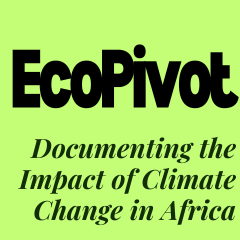Suleiman Hassana speaks with a calm resolve, her words shaped by years of learning and unlearning the complexities of climate change.
Her journey is not one of sudden epiphany but a slow burn, a relentless curiosity fanned into passion.
“I have always been curious about climate change,” she tells EcoPivot. “I went from constant research and reading about climate change situations in different regions of the world to stumbling across a volunteer opportunity with Education as a Vaccine.“
She speaks of how that initial spark has grown into something larger than herself—a calling, almost visceral in its urgency.
“The rush for continued climate advocacy and climate justice activism, is fueled by the need to inform and assist people with a voice and to enable them understand the climate situations that have occurred around them and how much they have or have not contributed to it,” she says, each syllable weighted with purpose.
Hassana speaks as though there was a force that compels her to not merely understand the changing climate but to fight against the indifference that often meets it.

There is a need for urgency and climate action, she says.
“First of all, we as citizens need to work on the need to evolve from certain practices that increases carbon emissions and also learn how to take care of our environment. After this the government can come in. This can happen through purposeful engagement between the government and the citizens, to discuss and implement strategies on how to curb environmental degradations and enforce policies. Public inclusion, sensitization, campaign funding, relief materials and awareness also will go a long way to tackle climate change.”
Her vision for Nigeria is one of cooperation, a delicate balance where citizens and government lean into one another’s strengths to tackle a crisis that seems to grow more insurmountable with every season.
“Climate change has impacted local communities and ecosystems in Nigeria negatively. The economic situation has also made it worse that those directly affected are left helpless. From loss of lives, properties and businesses most victims of climate change find it difficult to make a comeback to their normal lives. Climate change situations have reduced individuals and communities into ghosts of themselves, and without swift interventions these scenarios will continue to repeat itself, leading to an increase in displaced persons.”
But Hassana is not without hope. She believes in international collaboration—voices converging from different corners of the world united in the fight for sustainability. She believes the future of Nigeria hinges on a delicate dance between progress and preservation.
“Preventing climate change is better than trying to tackle it. There are several infrastructures that need to be rehabilitated that may help to reduce environmental degradation. That is why as advocates we have focused on the goal to educate individuals to take care of and manage their surroundings properly. Economic development will spike when the environment is well secured. Global leaders and organizations can support the work of environmental advocates by investing in the climate change sector, engaging and amplifying our advocacy messages, and coming up with effective resolutions and donations to assist displaced individuals.”
Hassana is very determined, unwavering in his commitment to steering the world toward sustainable action. And so, she continues, day after day, fueled by a passion that refuses to wane, driven by the stories of those who cannot speak for themselves, propelled by the urgency of a world on the brink.


